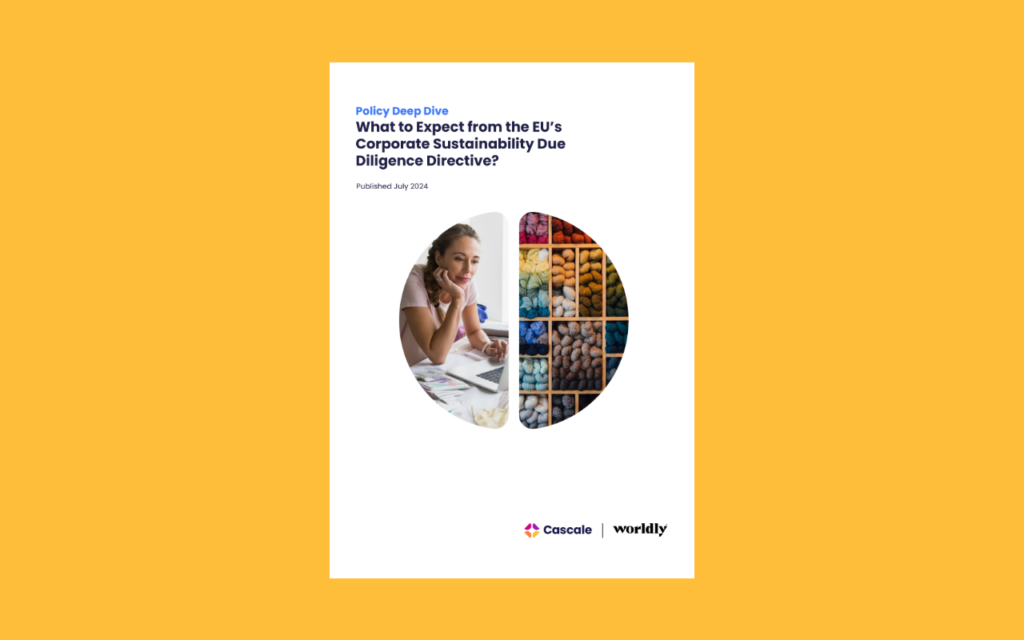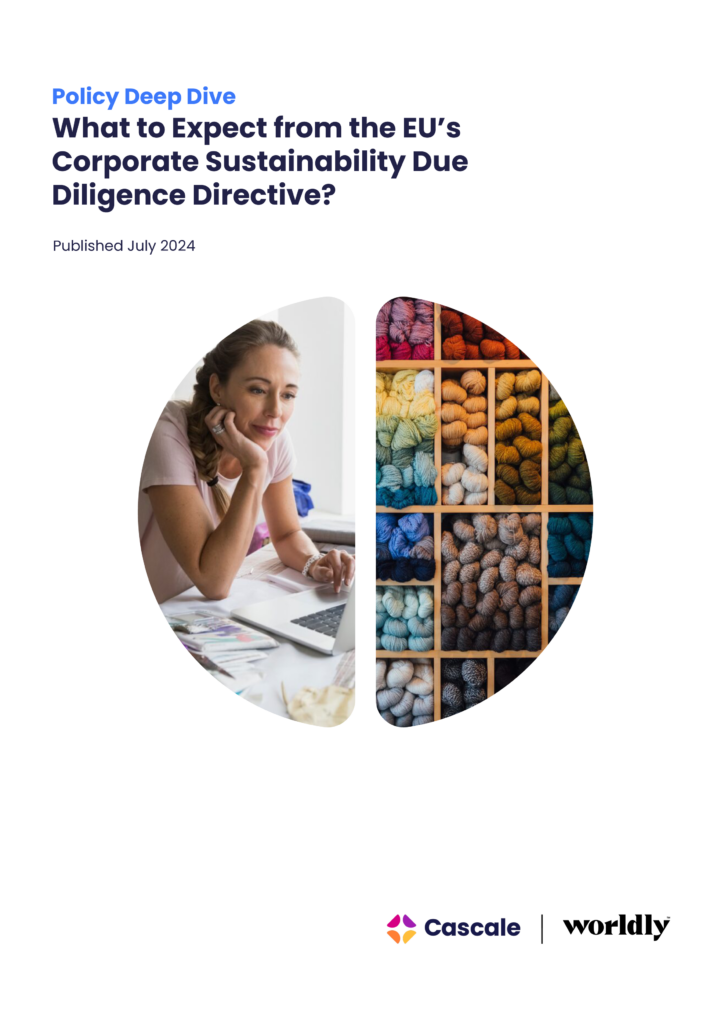
Dear Fashion: Let’s Step Up and Get Aligned
In a recent opinion editorial with WWD, CEO Colin Browne argues fashion needs to take more serious and coordinated action on sustainability. Read the highlights here!
Cascale, formerly the Sustainable Apparel Coalition, and Worldly, the planet’s most comprehensive sustainability data and insights platform, have published a deep dive paper analyzing the European Union’s (EU) Corporate Sustainability Due Diligence Directive (CS3D).

Cascale, formerly the Sustainable Apparel Coalition, and Worldly, the planet’s most comprehensive sustainability data and insights platform, have published a deep dive paper analyzing the European Union’s (EU) Corporate Sustainability Due Diligence Directive (CS3D).
This comprehensive analysis provides a detailed overview of the directive’s implications for businesses, especially within the textile, apparel, footwear, and wider consumer goods sectors.
The CS3D, adopted by the Council of the EU on May 24, 2024, and published in the EU Official Journal on June 13, marks a significant milestone in the EU’s efforts to enhance human rights and environmental due diligence. The directive requires large companies to identify, prevent, and mitigate adverse human rights and environmental impacts associated with their operations, which would set a new international benchmark for responsible business conduct.
Key highlights from the paper:
Businesses, stakeholders, and industry professionals can explore Cascale and Worldly’s deep dive paper to better understand the implications of CS3D on their businesses and how to prepare for its implementation. The paper provides valuable insights to help companies transition towards more responsible and sustainable business practices.
Read the full deep dive paper here.
The adoption of the CS3D is a significant step towards enhancing corporate sustainability and accountability within the EU. With detailed analysis and practical guidance, Cascale and Worldly aim to support Cascale members and Higg Index users in navigating this regulatory change and driving positive social and environmental impacts.
Explore Cascale & Worldly’s deep dive paper into the EU’s Corporate Sustainability Due Diligence Directive (CS3D). This detailed analysis provides essential insights into the directive’s implications for businesses, particularly in the textile, apparel, and consumer goods sectors. With detailed analysis and practical guidance, Cascale and Worldly aim to support Cascale members and Higg Index users in navigating this regulatory change and driving positive social and environmental impacts. Download the full deep dive now.


Cascale, formerly the Sustainable Apparel Coalition, has released its second Global Legislative Update to members.
The comprehensive quarterly report provides a detailed overview of legislative activities affecting the textile and apparel industry, as well as the broader consumer goods sector, across the EU, U.S., Asia, and other key markets. As a global nonprofit alliance with over 300 leading organizations, Cascale understands the crucial role of staying informed about policy changes to support sustainable practices and navigate evolving regulations.
Below is a summary offering a sneak peek into Cascale’s Global Legislative Update. The full document is available exclusively to Cascale members through Cascale Connect, a members-only platform. Cascale members can click here to access the full report.
From April to June 2024, significant legislative progress was made in areas such as climate change, labor rights, and promoting a nature-positive future.
Cascale’s Public Affairs team aims to provide members with regular updates and insights regarding key developments and potential effects of relevant legislation, aligning with Cascale’s strategic plan, policy priorities, and members’ greatest needs. Members may access exclusive public affairs and policy resources on Cascale Connect here.
Subscribe to our newsletter for the latest Cascale updates, events, and public affairs activities.
Not yet a Cascale member? Click here to learn more about becoming a member.

In March, Cascale and Worldly held a webinar, “Navigating Legislation & the Higg Index: Higg Product Tools with PEF and more.” In this blog, we share the recording, highlight key takeaways, and address submitted questions during the session.

Key Takeaways
“The PEF methodology is likely to play an important role in the future EU product and consumer law legislation. The Higg Product Tools methodology is well-positioned for alignment with Product Environmental Footprint (PEF)/PEF Category Rules (PEFCR), and the Higg Product Tools can support members in navigating evolving legislations and provide guidance in their compliance journeys.” –Elisabeth von Reitzenstein, senior director of policy and public affairs
“France has been, and probably will be for the foreseeable future, a frontrunner on sustainability legislation….The French label is based on a type of PEF. It has very strong alignment with the European Product Environmental Footprint principles. One difference on durability is that the French Methodology also includes ‘emotional durability’ to a more committed extent than the European one. This proves again that a common method on PEF is important…Another new French initiative is a draft bill targeting fast fashion and sometimes ultra-fast fashion… Also on the European level, France is fighting its corner on these issues. At a Council of the EU meeting on March 25, it called, alongside Sweden and Denmark, for an EU-wide export ban of hazardous textile waste to developing countries.” – Elisabeth von Reitzenstein, senior director of policy and public affairs
“Through our partnership with Cascale, Worldly is paying close attention to this regulatory landscape and what our customers need in order to prepare and report on their sustainability performance and progress. My team meets at minimum weekly with Cascale to get deep into the weeds on PEF, how it’s evolving, and what it means for our tools and the solutions we’re delivering. The Cascale team also helps us understand the challenges the industry is facing firsthand and ways to address it in the tools. Data is going to play a critical role in many, if not all, of these reporting requirements.” – Paula Bernstein, senior data manager, Worldly
“The concept of accessibility is really key for the Product Tools because we want a variety of users with different levels of LCA knowledge, as well as data availability to produce consistent environmental product footprint results.” – Quinten Geleijnse, manager, Higg Product Tools and lifecycle assessments
“Like the rest of the Higg Index Tools, we don’t want the sole purpose of the tools to be compliance – the tools should be going beyond regulation. We’re not just trying to have a PEF-compliant calculator. That is not ambitious enough to get the industry on track to where it needs to be. [The Higg Index] needs to be aligned with PEF, at minimum for compliance, but we do need to go beyond that.” – Joel Mertens, director, Higg Product Tools
“There are a lot of commonalities between Higg Index Product Tools, PEF, and France’s Ademe methodology but we do expect that even with the same product information, it is very likely you will have different results depending on which methodology you’re calculating to or which region you’re calculating to…One of the important things is while there are differences in the results, the impact categories, the data needs, there is a way to bring this all together, and that is the hub concept.” – Mertens
“One of the key aspects here is the difference between a footprint calculation and a footprint study, or LCA study. Our tools are calculating an environmental footprint of a product. An LCA study is distinct from the footprint calculation. There are additional requirements that have to be done to take you to that full study level, including a report and verification.” – Mertens
“PEF is an implementation of ISO-1440 and 44 standards. There are study requirements associated with that that I think get lost in the narrative. As to other tools in this space, the one thing I will say right now is there is not a final PEFCR for apparel and footwear. There are a lot of claims and misunderstandings as to what you can say in terms of compliance to PEF and PEFCR, and there’s no such thing at this point.” – Mertens
Questions Answered
On the webinar, speakers discussed relevant EU legislation and initiatives, including:
These regulations relate in different ways to the Product Environmental Footprint (PEF) method and product footprinting in general. CSRD requires a thorough assessment of an organization’s impacts, risks, and opportunities, and specifically mentions PEF as a way to assess these. In addition, the calculation of scope 3 emissions is required under ESRS E1, for which LCAs and/or PEF studies are useful. ESPR will likely require environmental impacts to be communicated to external stakeholders through the Digital Product Passport, for which PEF and LCA studies can be used. The European Commission proposal for the SGCD sees a more diminished role for PEF in its current form than initially foreseen. Although PEF might not become a mandatory requirement itself under SGCD, the more simplified procedure now pursued may include a presumption of conformity for environmental claims that are based on recognized methods, such as PEF. The French labeling law is based on calculations obtained from a central database run by Ecobalyse and the Agency for Ecological Transition (ADEME). This method is inspired by PEF but has some noticeable differences.
The PEF category rules (PEFCR) contain specific rules for product categories that complement the PEF methodology. The rules direct focus to the parameters relevant to that specific product group, further standardizing the methodology. The Technical Secretariats (TS) of the EU develop these PEFCRs, and Cascale coordinates the TS developing the PEFCR for Apparel & Footwear, which includes determining the product-specific methodology and primary data requirements. The TS does not determine what secondary datasets are to be used and has to stay in line with the general PEF methodology. The PEFCR is expected to be finalized in Q1 of 2025 and is currently in its consultation phase.
The Higg Product Tools aim to guide product eco-design decisions by providing reliable, high-quality data. Given the legislative developments and the changing data requirements that they cause, the Product Tools should evolve accordingly. Our objective is to develop the Product Tools as a hub that allows different users (with different levels of data availability and LCA knowledge) to compute different types of results for different purposes. This means users can continue to identify impact hotspots and calculate scope 3 emissions, while we expand the tools’ functionalities to allow for PEF calculations. It is important to note that PEF compliance entails more than calculations only as PEF requires an extensive study report that has to be verified by a third party.
Some steps towards PEF-aligned calculations have already been taken by Cascale and Worldly. The current Product Module methodology was developed in alignment with the 2021 version of the PEFCR. This means the Product Tools are already well set up to expand towards PEF-aligned calculations. The team has mapped the key remaining differences between the current Product Tools methodology and emerging regulatory frameworks. This exercise informs Cascale’s product information Member Expert Team (MET) that currently helps define the product-relevant information fields the Product Tools need to contain to align with the data requirements of various frameworks, including PEF, ADEME, and the DPP. As indicated by the workstream flow chart below, Cascale will begin integrating the ADEME and PEF calculation methodologies with the Product Tools when they are finalized. In the meantime, work with the Product Information and Product Impact MET and continue to develop the tools’ hub functionality.

Cascale is working with Wordly to create a harmonized set of information fields for the Product Tools, containing all required information from the different legislative frameworks and distinguishing between mandatory, recommended, and optional data points. This allows users to compute different types of results based on a single set of information and enables the provision of at least some results when limited data is available. Cascale will also expand its current list of five impact categories to the 16 impact categories specified in the PEF methodology. To enable different result types to be computed, different calculation methodologies will have to be integrated into the Product Tools, some of which rely on different datasets than those currently used in the tools. Cascale is working together with Wordly to allow for parallel impact calculations and add these new (EF) datasets to the tools.
Please note that the visual is taken from the webinar slide deck and the timeline reflects the March 27, 2024 webinar date. Depending on when you are viewing this blog post, the visual may be out of date.
Cascale and Worldly are working together to expand the Product Tools to enable users to select the energy mix used to manufacture their products. This will ensure the country or facility-specific energy mix is considered in the calculations, providing more precise impact calculations. A next step will be to connect the Higg Product Tools with the Higg Facility Environmental Module (FEM) to enable the sharing of facility data to be used for product impact calculations.
While many of our members can and are already using the product tools for homeware and home textiles, PEF currently is explicit for “Apparel and Footwear.” The sectors the EU Commission has identified for PEF are the following:
However, the Product Tools may still be used to assess adjacent products such as home textiles. Even our current Product Module tool has an option for an “other” product category, which is being used by some members to assess these types of products.
If you have any remaining questions, we invite you to email us at marcomm@cascale.org.

Webinar series will help prepare Cascale members and users of the Higg Index tools for compliance with current and emerging legislation impacting the global consumer goods industry.

Cascale, the global nonprofit alliance formerly known as the Sustainable Apparel Coalition, is set to launch a crucial webinar series in 2024.
Designed to navigate the complex regulatory landscape, this series will guide over 24,000 Higg Index users through compliance with current and upcoming EU and national legislation. This effort underscores Cascale’s commitment to equipping the consumer goods industry with the tools necessary for sustainability performance improvement amidst evolving regulations.
“The recently adopted Corporate Sustainability Due Diligence Directive by the Council of the EU underscores the importance of companies understanding the impact of new pieces of legislation and how tools like the Higg Index can support their compliance journey and due diligence process,” said Elisabeth von Reitzenstein, senior director, public affairs at Cascale. “We are proud of the work that goes into updating the Higg Index suite of tools to align with relevant existing and upcoming legislation that will help shift the consumer goods industry to one that gives back more than it takes to people and the planet.”
The “Navigating Legislation & the Higg Index” webinar series kicks off on March 27 with an inaugural webinar on how the Higg Product Tools intersect with key legislation such as Product Environmental Footprint (PEF), Ecodesign for Sustainable Products Regulation (ESPR), and Substantiating Green Claims Directive (SGCD). This webinar is open to all and attendees will receive summary materials; please click here to register.
Future sessions will explore how the Higg BRM tool complements legislation such as the European Union’s Corporate Sustainability Reporting Directive (CSRD), which entered into force in January 2023, as well as how the Higg Facility Tools align with relevant legislation like CSRD and the Corporate Sustainability Due Diligence Directive (CS3D), a European directive that is expected to be finalized in the upcoming weeks and will require due diligence for companies to prevent adverse social and environmental impacts across their value chains. The discussions will continue at Cascale events throughout the year; please click here to receive more information.
Cascale serves as a catalyst for standardized sustainability performance measurement across the consumer goods industry. Recognizing the evolving regulatory landscape, the organization initiated comprehensive analyses to map the Higg Index suite of tools with relevant existing and upcoming EU and national legislation. These analyses form the basis of the “Navigating Legislation & the Higg Index” webinar series and accompanying resources and, by identifying existing and future gaps, help inform the continuous evolution of the tools alongside regulatory changes to facilitate proactive alignment. In November 2023, Cascale published a summary report outlining the key insights gleaned from these analyses. By advocating for the tools’ continued relevance, Cascale empowers its members to navigate complex regulatory requirements with confidence.
In tandem with the webinar series, Cascale will provide its members with updates and resources to help them navigate the regulatory landscape, emphasizing how the Higg Index aligns with their legislative obligations and due diligence requirements. Click here to learn more about becoming a member.
CASCALE AND THE HIGG INDEX
Cascale’s Higg Index suite of tools is comprised of five modules: the Higg Facility Environmental Module (FEM), Higg Facility Social & Labor Module (FSLM), Higg Brand & Retail Module (BRM), Higg Materials Sustainability Index (MSI), and Higg Product Module (PM). These tools are designed to enhance standardized sustainability practices and performance for the consumer goods industry; in many cases, the tools can also support compliance and legislative requirements.
CASCALE AND PEF/PEFCR/CSRD
Cascale actively advocates and collaborates with policymakers, which includes facilitating the Product Environmental Footprint (PEF) Technical Secretariat for Textiles and Footwear and providing technical expertise for drafting the sector-specific methodology for the textile sector (i.e. the PEFCR). Cascale’s Higg BRM team will provide technical expertise to EFRAG, a coalition funded by the European Commission, to draft the Corporate Sustainability Reporting Directive (CSRD) sector-specific data points for the textile sector.
ABOUT CASCALE
Cascale is the global nonprofit alliance catalyzing collective action toward equitable and restorative business practices in the consumer goods industry. Spanning 300 retailers, brands, manufacturers, governments, academics, industry associations, and nonprofits across 37 countries, we are united by a singular vision to give back more than we take for people and the planet. Cascale’s membership includes apparel, footwear, home furnishings, sporting and outdoor goods, and bags and luggage companies.
Formerly known as the Sustainable Apparel Coalition, Cascale owns and develops the Higg Index. Initially formed to create standardized sustainability metrics, Cascale has sharpened its focus to driving pre-competitive collective action for a unified industry transformation. As an independent entity, Cascale brings together brands, retailers, manufacturers, NGOs, academics, and industry associations to combat climate change, ensure decent work, and contribute to a nature-positive future.